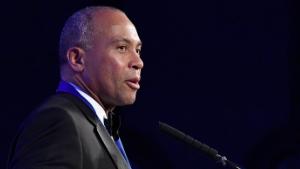Democrats' 2020 uncertainty has heavyweights thinking about a run
Three Democratic heavyweights this week have dangled the possibility of a 2020 White House run, a reflection of the extraordinarily unsettled nature of the Democratic field only a few months before voting begins.
On the eve of the first public impeachment hearings, former New York Mayor Michael Bloomberg made a run to Arkansas on Tuesday to secure his spot on that state's Democratic primary ballot, should he decide to run. Former Massachusetts Gov. Deval Patrick weighed a late entry to the race while facing down Friday's filing deadline in the key state of New Hampshire. And Hillary Clinton coyly suggested, once again, that she could leap from the sidelines.
Democratic voters want the 2020 field to shrink, not grow
Clearly enjoying the opportunity to taunt Trump at this vulnerable moment in his presidency -- and undoubtedly unnerving some current 2020 Democrats -- Clinton told BBC Radio that she was not running for president in 2020, but she left the door ajar.
"Never say never, and I will certainly tell you I'm under enormous pressure from many, many, many people to think about it," Clinton told BBC radio in the midst of a publicity tour for her new book with her daughter, Chelsea. "But as of this moment, sitting here in this studio talking to you, that is absolutely not in my plans."
In Clinton's case, teasing another White House bid was most likely a lighthearted way of drawing publicity for her new book. Last month, when Trump tweeted that "Crooked Hillary Clinton" should run again to "steal it away from Uber Left Elizabeth Warren," the 2016 Democratic nominee playfully tweeted back: "Don't tempt me. Do your job." (CNN reported in October that Clinton's admirers have tried to coax her off the sidelines, but she has repeatedly ruled out a run).
Still, the fact that Patrick and Bloomberg could soon join the field underscores how fractured Democrats are three months before the opening contest in Iowa.
The party still has not settled its long-running debate about whether to swing hard to the left by nominating a candidate like Warren, a senator from Massachusetts, or Sen. Bernie Sanders of Vermont -- both of whom have excited a younger generation of activists -- or embrace a more moderate candidate who could theoretically appeal to Republicans and independents disenchanted by Trump, as well as blue-collar voters who the party lost to Trump in 2016.
The latest polls in early-primary states demonstrate that lack of consensus among Democrats about who would be strongest against Trump, which has prompted much of the hand-wringing in recent months.
A new Monmouth University poll of likely caucusgoers out Tuesday showed South Bend, Indiana, Mayor Pete Buttigieg surging to the top of the field with 22%, followed by Biden with 19%, Warren with 18% and Sanders at 13%. All four were within the margin of error -- meaning that none of them could claim front-runner status in the Hawkeye State. (Bloomberg registered at 1%).
Biden held a slender lead in New Hampshire in a new Quinnipiac University poll this week with the support of 20% of likely voters in the state. Warren followed at 16%, Buttigieg at 15% and Sanders at 14%.
The glimmer of hope for Patrick and Bloomberg at this late stage is rooted in Democrats' uncertainty about Biden, who was perceived as a far stronger front-runner before he entered the race earlier this year. But both men are untested among the broader electorate.
The filing deadlines to get on key state ballots this week appear to have forced the hand of Bloomberg and Patrick, who could face a major disadvantage if they miss the chance to compete in all 50 states, particularly if the race devolves into a prolonged delegate fight.
Last week Bloomberg's team filed the paperwork needed to get on the primary ballot in Alabama. (Patrick missed the deadlines in Alabama and appears to have missed Arkansas').
Bloomberg's adviser Howard Wolfson told CNN in a statement last week that Bloomberg plans to skip the first four primary contests. "If we run, we are confident we can win in states voting on Super Tuesday and beyond, where we will start on an even footing," Wolfson said.
On Tuesday in Arkansas, Bloomberg told a gaggle of reporters he was "still exploring what we're going to do" and deflected questions about Biden's strength as a candidate, calling him "a very nice guy."
"I've known him for a long time, and if you want to know about Joe Biden, you've got to talk to Joe Biden. He's running his campaign, I'm running mine and one thing doesn't necessarily have anything to do with another," Bloomberg told reporters.
"All I've got to do is -- if I run -- explain to people what I think is wrong with this country, and how I would fix it. And then the public can make a decision," the former New York mayor said.
"I've been more and more upset with what's going on here," he said. "We don't talk to each other. We don't work together. There's a lack of honesty and civility. That is not good for our country, and I've got two daughters and two grandkids that I care about. And I'd like to do something about it, whether it's running for president or something else."
Dan Merica and Jeff Zeleny contributed to this report.
News Courtesy: www.cnn.com












